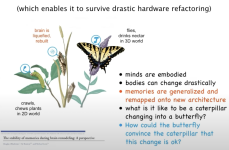Everyone is talking about how magic is the next big thing, everyone is writing books on magic. I have two magician friends, one just got an arts residency at MIT working alongside a cognitive scientist. I have in my lap Poets as Spellcasters and The Secret Occult Teachings of Jim Morrison, both gotten from my local Barnes & Noble where they're featured new releases.
There's been pretty widespread activism & protest culture the past decade. Lots of unrest over 60s-era issues: womens lib, race relations, big resurgence in socialism. A wave of recent assassinations. Cannabis and psychedelic use are at all-time highs. Sense of moral corruption in/betrayal by government. The Internet has become an underground press. There is a sex revolution happening around dating apps, polyamory, queer/trans stuff. Back to the land movement, online communes, group homes, a thousand whacky ideologies and AI x New Age religions.
Astrology and tarot have never been more popular, it's really crazy actually, whether you're in the arts or just a normie horse girl you're into astrology, even computer science engineers are into astrology. I have two friends who read tarot for a living. There are astrology-themed bars in Bushwick. I go to a West Coast coffeeshop they have horoscope-themed lattes.
I guess much of this stuff is connected. I was thinking, reading the Morrison book, how the existential fear of the Atomic Age is kinda like the existential fear of AI and climate change today. There is an apocalyptic tone infiltrating everything. And in The Master thread we talked about how new religious movements come out of periods of dissatisfaction and unrest, such as post-war. Periods where young people are questioning whether the ruling order/their parents/the ruling order really has control, whether its prescriptions of true and false, rational and irrational are worth listening to.
I was talking to a friend recently he said that the only magic anyone talks about is, more or less, hyperstition. It's edged out all the other kinds, it's the only kind of magic we understand anymore, we are all very fluent in hyperstition. (Or in manifestation, which is very similar. Belief becoming real, map changing territory, reflexivity.)
I do think there are other kinds though, some of the ones I've observed are:
- frame control: setting the implicit terms of discourse, or controlling its form (e.g. its pace)
- implanting voices: songs are really good at this, you get tags stuck in your head, but poetry does it too. also implanting voices in the freud introjection sense—the way parents implant voices in you guilting you telling you what to think and do
- mimetic contagion, transmission or production of emotional states, mental illnesses, preferences, stances; inciting or turning on or enchanting
- transfer phenomena, e.g. frame transfer, style transfer
- ability to imagine new equilibria, new ways of being in the world that work; neologism is tied up with this, new words changing the language.
- altering the connotations of words, objects, the way that advertising/marketing works to build up or alter reputations of products; manipulation of the public symbolbank
- ability to nudge groups into coordination equilibrium—ability to get things done socially, instigate mimetic cascades, play confidence tricks, make common/mutual knowledge cascades happen a la Emperor's New Clothes
- channeling of ancestors, in a secular historical sense: aligning yourself with tradition, in a ts eliot way; establishing historical vectors and teleologies that people believe in
- vibework: this is similar to mimetic transfer stuff—but setting the tone in a room
- energy healing? people say this is real but I have no experience/theory of how it works
Probably all are rationalized forms of what past generations have called subliminal messaging, mind control, demonology, spellcraft (language altering landscape).
I think music is very magical too, maybe the most magical artform along with poetry. See the Pied Piper, or Dionysus for music, and the schizo stuttering shaman poet spellcaster for language.

